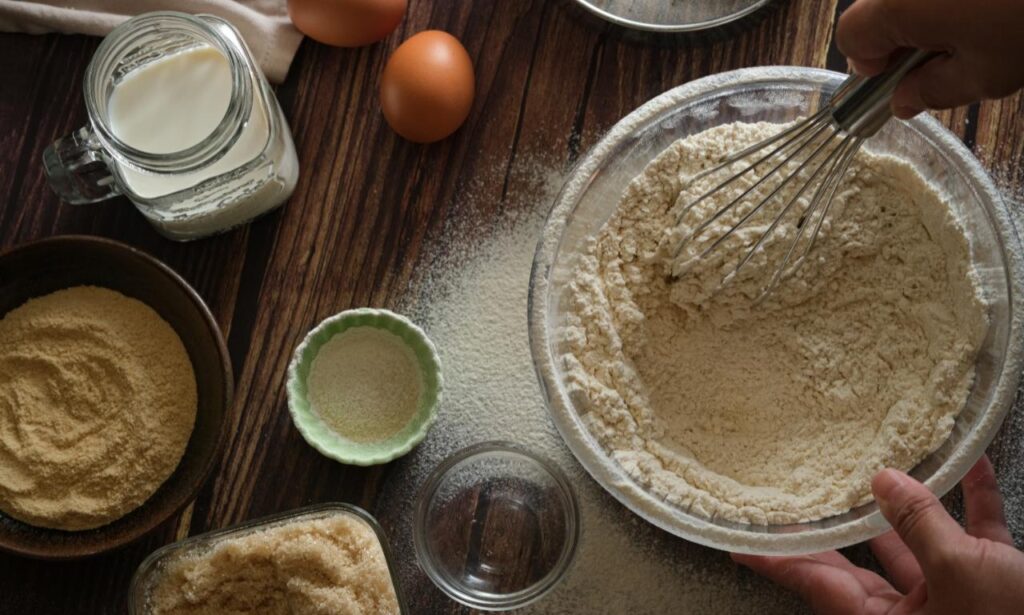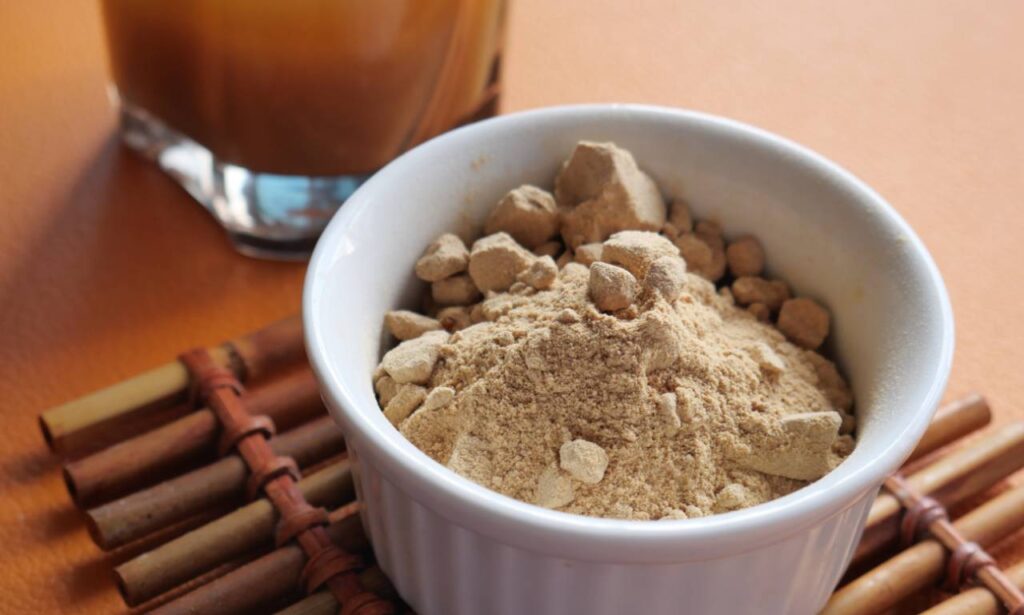Have you ever come across brewer’s yeast? Perhaps you’ve spotted it on the shelves of health food stores or listed among the ingredients in some skincare and haircare products. Brewers yeast, in reality, is a highly beneficial and intriguing product with multifaceted applications and advantages for our well-being. In this article, we’ll explore what brewer yeast is, its utilization in culinary, baking, and cosmetics, and delve into its health benefits and potential adverse effects.
What is brewers yeast and how is it created?
Brewer’s yeast constitutes a type of single-celled fungi known as Saccharomyces cerevisiae. These fungi feed on sugar, yielding alcohol and carbon dioxide as byproducts. This process, known as fermentation, involves the production of beer, wine, and other alcoholic beverages. Breweries obtain brewer’s yeast as a byproduct during beer production. They separate it from other components after fermentation and then proceed to dry it. It is available in powder, flakes, tablets, or capsules.
Brewer’s yeast stands as a rich source of protein, fiber, B-complex vitamins, and minerals such as chromium, selenium, zinc, magnesium, and potassium. Additionally, it harbors various compounds possessing antioxidative, anti-inflammatory, and antimicrobial properties. Notably, brewers yeast serves as a commendable reservoir of beta-glucans, a type of soluble fiber aiding in the regulation of blood sugar, cholesterol, and the immune system.
How brewers yeast is used in cooking and baking?
Brewer’s yeast can be utilized as a dietary supplement or a seasoning for various dishes. Its nutty and mildly sweet taste harmonizes well with vegetables, soups, sauces, salads, pasta, rice, grains, and cheeses. Sprinkling brewer yeast over food or blending it with water, milk, juice, or yogurt is common. The recommended daily dosage of brewer’s yeast is around 15 to 30 grams, approximately two to four tablespoons.

Furthermore, brewer’s yeast finds use in crafting bread, dough, pastries, and assorted baked goods. It facilitates the leavening of dough, resulting in a soft and airy texture. It’s advisable to incorporate brewers yeast into flour or dissolve it in warm water alongside a pinch of sugar and salt.
About half a teaspoon of brewers yeast per cup of flour is the suggested measurement. To activate the brewers yeast properly, it’s crucial to place it in a warm spot, allowing it to foam and double in volume, a process that usually takes about 10 to 15 minutes. Afterward, it can be kneaded with flour and other ingredients, left to rise once more before proceeding to bake.
In beer production, brewers naturally use brewer’s yeast by adding it to the wort, a liquid that contains sugars derived from malt. This yeast transforms these sugars into alcohol and carbon dioxide, influencing the beer’s flavor, color, foam, and alcohol content. Different strains of brewers yeast cater to specific types of beer like lagers, ales, stouts, wheat beers, and others.
How brewers yeast is used in cosmetics and skin and hair care?
Brewer’s yeast serves as a natural ingredient for skincare and haircare. Enriched with vitamins, minerals, and amino acids, it aids in hydrating, rejuvenating, shielding, and enhancing the appearance of both skin and hair. Application methods vary—from direct application to the skin or hair to blending it with other ingredients like honey, yogurt, lemon, egg, and olive oil, among others.
As a facial mask, brewer’s yeast cleanses, nourishes, and revitalizes the skin. Applying a thick paste of brewer’s yeast mixed with a bit of water or milk onto cleansed skin, leaving it on for 15 to 20 minutes, and then rinsing it off with warm water, followed by the application of a moisturizing cream, constitutes the process. Adjust the frequency of using this mask based on individual skin types, usually recommended for application once or twice a week.
Utilized as a body lotion, brewer’s yeast hydrates softens and smoothens the skin. Blend brewer’s yeast with a small amount of water or milk to form a liquid mixture, then apply it all over the body after a shower, gently massaging it in. Let it absorb into the skin and remove excess with a towel. This lotion can be used daily or as needed.
Additionally, as a shampoo or conditioner, brewer’s yeast strengthens, nourishes, and adds shine to the hair. Create a foamy mixture by combining brewers yeast with a small amount of water or milk, and apply it to wet hair, gently massaging the scalp. Rinse with warm water and repeat if necessary. This shampoo or conditioner can be used once or twice a week, depending on hair type.
What are the health benefits of brewers yeast?
Brewer’s yeast isn’t just a tasty and beneficial addition to diets and cosmetics; it’s a true ally for our health. Brewers yeast boasts numerous health benefits, including:
- Improving digestion and gut flora. Brewer yeast contains probiotics—beneficial bacteria aiding in maintaining intestinal balance and health. It also assists in preventing and treating digestive disorders like diarrhea, constipation, bloating, cramps, irritable bowel syndrome, and ulcerative colitis.
- Enhancing the immune system and resistance to infections. With beta-glucans, soluble fibers stimulating white blood cell activity and antibody production, brewer’s yeast fortifies immunity. It also contains antioxidants shielding cells from damage caused by free radicals and inflammation, aiding in preventing and treating infections like colds, flu, fungal infections, and urinary tract infections, among others.
- Lowering cholesterol and triglyceride levels in the blood. Rich in fiber, brewer’s yeast aids in reducing fat and sugar absorption in the intestines. It also contains chromium, regulating insulin and blood glucose levels, contributing to preventing and treating cardiovascular diseases such as high blood pressure, atherosclerosis, heart attacks, and strokes.
- Increasing energy levels and vitality. Brewer’s yeast holds B-complex vitamins vital for converting food into energy and normal nervous system function. It contains proteins, essential for muscle, bone, skin, hair, and nail structure. This yeast helps prevent and treat fatigue, stress, depression, anemia, weakness, and hair loss.
- Enhancing the appearance and health of skin, hair, and nails. With biotin, a vitamin crucial in keratin synthesis—the protein constituting skin, hair, and nails—brewer’s yeast aids in maintaining healthy skin, hair, and nails. It also contains zinc, supporting the health of these body parts and assisting in preventing and treating acne, eczema, psoriasis, dermatitis, dandruff, dry skin, brittle hair, and nails.

Brewer’s yeast for weight gain
Brewer’s yeast contains vitamin B, responsible for improving appetite, alongside being exceptionally rich in proteins, collectively positively impacting appetite improvement, making it remarkable for weight gain. It aids in muscle building as it encompasses all essential amino acids the body can’t produce independently. Brewers yeast serves as a dietary supplement for individuals aiming to increase their body weight and muscle mass naturally and healthily.
However, solely relying on brewer’s yeast isn’t sufficient for weight gain. It’s essential to maintain a balanced and varied diet, ensuring adequate intake of calories, fats, carbohydrates, and other nutrients. Regular exercise is also crucial to stimulate muscle synthesis and prevent the accumulation of adipose tissue. Brewer yeast acts as a supportive measure that can enhance results but doesn’t replace healthy habits.
What are the possible side effects and contraindications of brewer’s yeast?
Brewer’s yeast is generally safe and well-tolerated when taken within recommended doses, with no serious side effects. However, some individuals might experience allergic reactions, presenting as rash, itching, swelling, redness, sneezing, coughing, difficulty breathing, or anaphylactic shock. If any of these symptoms appear, it’s advisable to stop using brewer’s yeast and seek medical assistance.
Furthermore, brewer’s yeast might interact with certain medications, supplements, or herbs, enhancing or diminishing their effects. This particularly applies to diabetes medications, anticoagulants, antibiotics, antidepressants, antifungal drugs, immunosuppressants, and others. Consultation with a doctor is recommended if taking any of these medications before using brewers yeast.
Healthcare professionals recommend that pregnant or breastfeeding women, children under 12 years old, and individuals with autoimmune diseases. For gout, kidney stones, chronic infections, or other serious health conditions consult them before considering the use of brewer’s yeast.
Why you should include brewer yeast in your diet and care
Brewer’s yeast transcends being merely a brewing ingredient. It’s a highly valuable and intriguing product boasting myriad applications and benefits for our bodies. Rich in proteins, fibers, vitamins, minerals, and other compounds, it aids in enhancing digestion, immunity, cholesterol levels, energy, vitality, skin, hair, and nails. Brewers yeast functions as a dietary supplement, a culinary spice, and a key element in baking bread, dough, pastries, and more. It also serves as a natural ingredient for skincare and haircare, in the form of masks, lotions, shampoos, and conditioners.
Typically safe and well-tolerated within recommended doses, brewer’s yeast might trigger allergic reactions or interact with certain medications, supplements, or herbs. Consulting a doctor before using brewers yeast, especially if having a medical condition or taking medications, is advisable.
To harness the full benefits of brewer yeast, consider incorporating it into your diet and skincare regimen. It’s a simple, affordable, and effective means to enhance your health and beauty. Brewer’s yeast stands as a genuine ally for your body!
